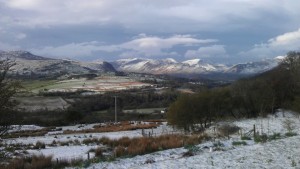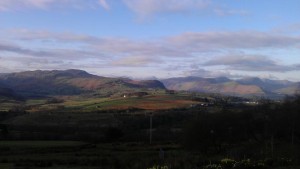
April 20, 2012, by Matt
A Day in the Life of a Geographer … Andy Cook
It is interesting to note how quickly nine weeks have passed since my last contribution to the Geog Blog, possibly due to the fact that it has been an extremely busy term teaching wise. This week I will be offering some thoughts on the often hidden practices in which academics are involved in over the Easter vacation (that sounds a little dubious, but bear with me). Particularly, in my case, this has involved an eight day field course to the Lake District with the first year students, undertaking a lot of marking and setting up a coherent plan for research and dissemination over the Summer. The first of these is perhaps due the most attention.
One of geography’s primary strengths (whether you are of the physical or human persuasion, or indeed straddle the two areas) is the essentially practical nature of the discipline as a whole. Fieldwork and actual hands-on research form a core part of what drives and motivates us academics. Fieldcourses such as the Lake District provide us with ample opportunity to enthuse about (and hopefully inspire) a new generation of geographers in a less formal and rigid environment than that provided by lectures, seminars and tutorial groups. This year six members of staff and five PhD students were in the field for eight days undertaking a variety of projects with two groups of c.88 undergraduates split over two 3 day ‘waves’ staying at the exceptional Blencathra Field Centre in the Lake District (see views from Centre below).
The human geography staff (myself, Profs Matless and Smallman-Raynor) had the enviable task of acting as professional tour guides on the compulsory human geography project day, exploring a number of important themes surrounding the West Cumbrian Coast. This area is often ignored by the casual visitor given the predominance of the Lake District in our imaginations which is unfortunate. The area is actually perfect for encouraging students to think about a number of themes ranging from Britain’s energy generating future (given the presence of Sellafield), issues of environmental degradation and epidemiology as well as the importance of international trade and regional development and the differing strategies of towns in the area for coping with industrial decline.

The School of Geography’s Prof. David Matless in full flow discussing issues of regional identity on Workington beach.
In addition the students have a physical geography day involving mapping and estimating the size of glaciers and accounting for various geomorphological features deposited during the Younger Dryas. On the final day of each trip the students have the opportunity to undertake a more specific project with one of the members of staff and do some independent research. The project I ran focused on the economic geographies of Workington and, incorporating a visit to Allerdale Borough Council and the Helena Thompson Museum, aimed to encourage students to think historically about issues of industrial growth and decline and the implications for this on the town. The projects themselves involved assessing the urban regeneration strategies in place in Workington and finding out whether they could be seen as successful or not.
Despite the obvious pedagogical benefits of field learning, such courses provide members of staff with an exceptional opportunity to engage with students and get a grip on where their heads are at and what they enjoy about university life and what they don’t – surely the best form of feedback and evaluation there is. Additionally, it gives the staff a chance to interact with other colleagues whom they would not normally collaborate with and build positive relationships with the assisting PhD students – usually over a pint of Cumberland ale in the evening and a hastily consumed boiled egg at 7am. The collegiality can alas go a little far as I can attest to having been soundly thrashed at ping-pong by a senior colleague…(21-7 for those with knowledge of what I believe to be a cruel sport). We eventually arrived back in Nottingham at the end of the trip somewhat weary but highly motivated and invigorated, eager to crack on with our dissertation marking after, quite appropriately, several days sleep.



[…] in the space of 4 days). Which, despite the fluctuations in weather was a great experience, see Andy Cook’s blog for more about the trip. I can confirm at least 1 geographer was definitely enthused and inspired! […]